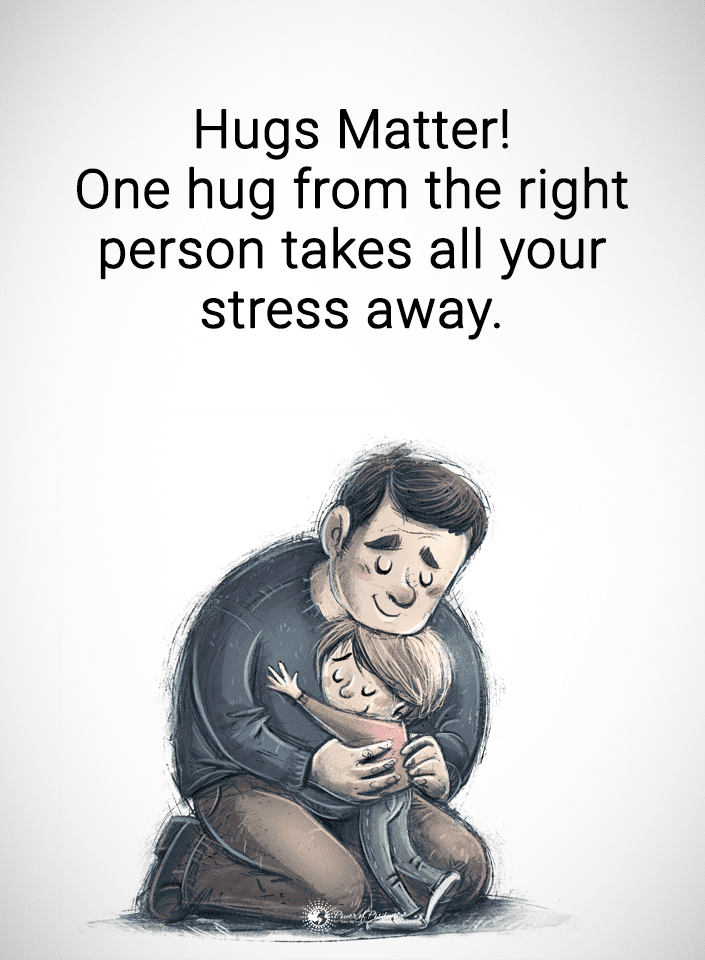It’s easy giving your kids hugs and spending time cuddling when you have a toddler. At that age, kids want to show affection, and they love to embrace you. As time goes on, they’ll ask for hugs less often, with teenagers rarely (if ever) asking.
Once you have a teenager at home, offering parental affection becomes more complicated. Even still, being affectionate is essential to your child’s development.
Teenagers won’t usually come to you for a hug or ask for one, either. Whether they think they’re too old or cool to embrace you, your child won’t come running to you like they used to. Sometimes they even believe they don’t need it anymore.
On the other hand, you might get moments when they appreciate your hug and squeeze you a little tighter or longer than usual. Either way, going out of your way to give hugs is beneficial because your teenager needs them.
What the Experts Say About Hugs
Family therapist Virginia Satir explained to Forbes, “We need four hugs a day for survival. We need eight hugs a day for maintenance. We need twelve hugs a day for growth.”
You can hug your teen when you see them in the morning and again before they leave the house for the day. When they return home, you can give them another hug, then give them one before bed. These four hugs are only the bare minimum, and you can strive for more connection with your teenagers in other ways.

Why Teenagers Still Need Hugs
Hugging your teen offers many benefits that you likely haven’t thought about. These perks include the following:
1 – It Makes Them Feel Good and Safe and Calms Them Down
Even if your child doesn’t tell you, your hugs are powerful in calming them down, easing their fears, and giving comfort. Your embrace makes them feel cherished, loved, and safe. It can also remind them they’re not alone, even when life gets confusing and challenging.
Hugs can boost your teenager’s mood, alleviating irritability and burnout. They can also help decrease depression and increase happiness.
2 – Teenagers Crave Hugs, But They Often Won’t Tell You
Children, even teenagers, crave touch, so offer it without waiting for them to ask. You’ll want to respect their desires and comfort levels, but small increments of physical affection can be beneficial.
Teenagers often experience sadness over losing cuddle time or random hugs from you. They pretend they don’t care and hide their feelings because they think it’s part of growing up. They’ll secretly be thrilled each time you break that barrier and embrace them or offer physical affection.
3 – It Prevents Them from Seeking Love Elsewhere
Since teens crave touch, they’ll find it wherever they can. They might hug their friends, but it can’t replace healthy parental affection.
They’ll seek it elsewhere when they don’t get physical affection from you. It could lead to them seeking sexual relationships that they aren’t ready for. Instead, offer them the safe touch they need, so they don’t put themselves in a bad situation.
4 – More Likely to Avoid Trouble in School or Legal Trouble
Having a loving home and receiving hugs from parents can help a teen make good choices. They’re more likely to avoid getting in trouble at school and less likely to get in legal trouble. These teens have a strong sense of self and a better self-image than others, making them naturally want to do good things.
5 – Hugs May Improve Their Well-Being
Giving hugs and showing physical affection, even when your child doesn’t seem to want it, is highly beneficial. It boosts their self-esteem, increases their performance, and makes them more resilient. It also improves their overall well-being.
When someone gets a hug, their body releases oxytocin, improving social bonds and feelings of love. It can also help them experience gratitude. Hugging can also make your child feel close to you and alleviate stress for both of you.
6 – Helps With Communication
Taking time to hug your teen can help break barriers that prevent communication. It can help you communicate things you can’t say or that your child doesn’t want to hear. Then, your child can recognize how much you love them and be open to discussing things.
Hugging can help you connect with your teenager after a disagreement or argument. It helps repair the damage and build a bridge to allow for communication despite the setback.
7 – It Helps Teenagers Find Their Sense of Identity
Teenagers are often filled with self-doubt and have trouble finding their identity. This issue makes them more likely to experience turbulence as they try to figure things out. Having loving parents can make a difference because a strong foundation of love helps them find themselves.
8 – They’ll Feel Confident About Their Body
Regular hugs and affection from parents help teenagers recognize that their bodies are healthy and lovable. Everything about them changes during that time, and loving touch can help them see that it’s normal. When you continue wanting to show physical affection, they’ll feel healthy and good about their physical presence.
Why Giving Hugs Might Feel Uncomfortable
You might feel separated from your child because they won’t always ask for hugs anymore. Plus, the ways you showed affection when they were little might feel awkward now that they’re older. The good news is that despite this separation, you can find new ways to connect and give hugs.
Not wanting hugs and cuddles anymore is part of the process that allows them to become independent adults. They learn to go without their parents’ affection as often and no longer want to get treated like children. Teenagers also often feel embarrassed about hugging their parents.
If you didn’t get physical affection as a teenager, you might feel uncomfortable giving it to your teen. However, your teenager still needs it, and you should push through the discomfort.

What to Do When Your Teen Rejects Hugs
Don’t give up if your teen rejects your hugs despite your best efforts. They still need physical affection even if they’re unwilling to cave to your embrace. When that happens, you can connect with them while respecting their boundaries.
Start With Non-Physical Affection
When your child doesn’t want you to touch them, you can connect with them in non-physical ways. Sit next to them while you watch their favorite show, or spend time talking to them about whatever comes to their mind. You might not think what they want to talk about is interesting, but it’s all a big deal to them.
Try Less Intimate Touch
Once your child becomes comfortable with non-physical affection, you can try to step it up. Give them a high five when they do a good job, and touch their arm or shoulder when you talk. It can help them feel connected to you and open up the possibility of hugs.
Give It Time
Getting your teenager comfortable with physical affection can take time. Be patient and continue building an emotional connection until they’re ready for more. It can be frustrating, but push through and keep trying to get through to them.
Give Them Your Attention
When your teenager has your attention, they feel connected to you. They’ll realize when they don’t have your full attention, making it harder to get through to them.
Make sure you offer your full undivided attention when they’re present so that they know you’re interested and that they matter to you. Listen to them even when you’re not interested in the topic to help break the barrier. The more often you do it, the more likely your teen is to accept your physical affection.
Ask Before You Touch Them
When your teen resists hugging and physical affection, you should always ask before you touch them. It makes them feel safe and comfortable because they know you won’t cross their boundaries without permission. Asking also teaches them about consent, encouraging healthy relationships later.
Seven Ways to Offer Physical Affection Besides Hugs
When they don’t let you give them hugs, it’s best to be sensitive to what they want and need. However, there are other ways to show physical affection.
Offering affection in other ways can have the same effect as a hug, so when you can’t get the recommended twelve hugs in a day, you can try the following:
- tousle their hair
- give high-fives
- offer a gentle elbow nudge as you joke with them
- give a back rub
- kiss the top of their head
- put your arm around them
- touch their arm or shoulder while you talk
When you show affection, don’t embarrass them in the process. Do it away from others so your child can find comfort without feeling awkward.
Even when they resist, let them know they are loved and lovable. It boosts their self-esteem, improves mental well-being, and encourages healthy relationships. When you prioritize hugs and affection during the teenage years, your efforts could result in an adult child who isn’t afraid to hug you and show love.

Final Thoughts on the Reasons Why Teens Still Need Hugs (even if they won’t ask)
Teenagers might not realize it, but they need your hugs, physical affection, and warmth to continue developing. Many teenagers become touch-deprived because they won’t ask for a hug, and their parents don’t push it. It’s essential to find ways to stay physically connected to your teens so they can experience all the benefits.
Physical affection from a parent will give them the best chance in life. It improves their overall well-being and teaches them about safe touch while preventing them from looking for love from unsafe sources. Don’t give up if your teen resists your hugs because you can always start by showing your love in other ways.
!function(r,u,m,b,l,e){r._Rumble=b,r[b]||(r[b]=function(){(r[b]._=r[b]._||[]).push(arguments);if(r[b]._.length==1){l=u.createElement(m),e=u.getElementsByTagName(m)[0],l.async=1,l.src=”https://rumble.com/embedJS/ug6pt”+(arguments[1].video?’.’+arguments[1].video:”)+”/?url=”+encodeURIComponent(location.href)+”&args=”+encodeURIComponent(JSON.stringify([].slice.apply(arguments))),e.parentNode.insertBefore(l,e)}})}(window,document,”script”,”Rumble”);
Rumble(“play”,{“video”:”v4estn”,”div”:”rumble_v4estn”,”autoplay”:2});
The post 8 Reasons Teens Still Need Hugs (even if they won’t ask) appeared first on Power of Positivity: Positive Thinking & Attitude.







